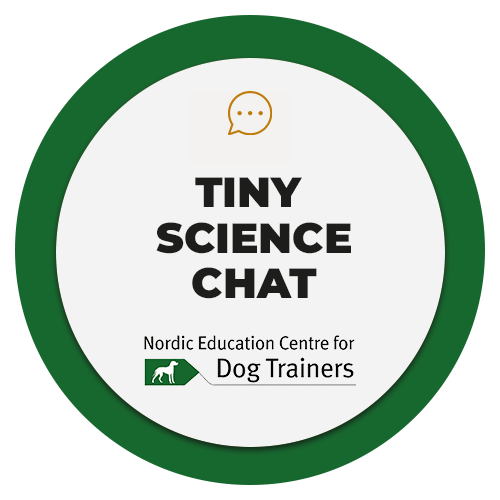
Tiny science chat journal club
Tiny science chat journal club
with Lisa Dickel

Membership fee: 8 EUR/9 USD/80 NOK per month
Open to anyone interested in seeking more knowledge :)
Lisa about the journal club:
I will give you a general idea of how science accumulates knowledge and generates new questions, and how you can use these processes to answer questions by reading the intermittent outputs - journal articles! We will have a look at a variety of journal articles of different types and have some introductions to some important topics that are relevant to be able to understand articles.
The central topic will be: What is a dog? And what does it mean for them to be in a captive environment designed by humans, genetically, ecologically, behaviourally? What are the costs and benefits of that, and how can we (as humans) mitigate some of these costs? I am interested in dogs, what they are as a species in terms of their ecology and evolution, and how this matches - or also changes - with the captive environments that provide them/ restrict them in our society. Then I am interested in how their evolutionary, genetic, ecological makeup affects their welfare when kept in these particular ‘modern’ captive environments, how they adapt behaviourally, and how we can mitigate the challenges this poses on our companion dogs.
About Lisa:
I am currently a PhD candidate in Evolutionary ecology at the Norwegian University of science and technology (NTNU) in Trondheim, and I have been working with cattle, spiders, plants, and currently birds, while always also wondering how the principles of evolution and ecology I studied would apply to dogs. From 2020-2022 I completed my dog training education at the Nordic Education Centre for dog trainers with Lisbeth; and I am excited to find overlap and combine my more practical work with dogs and my academic work in projects as in this journal club.
Preliminary plan
1. Welcome / overview / what is science / reading an article /Theme of the journal club
2. Empirical paper I: Duranton & Horowitz 2018: Welfare implications of nosework
3. From data to evidence: a quick look at statistics (Duranton 2018)
4. Empirical paper II: Corrieri 2018: Companion and free-ranging Bali dogs: Environmental links with personality traits in an endemic dog population of South-East Asia
5. Empirical paper III: Diurnal activity patterns of equally socialized and kept wolves and dogs
6. Accumulating knowledge: References, other types of articles, finding articles
7. Review paper I: Mayer et al. 2022: Pampered pets or poor bastards? The welfare of dogs kept as companion animals https://www.sciencedirect.com/science/article/pii/S0168159122000983
8. Review paper II: Where do we stand in the domestic dog positive emotion assessment: A state-of-the art review and future directions
9. Opinion piece I: Horowitz: The dog in the anthropocene
10. Open session: Read one paper that's relevant dependent on participant contributions, questions asked, newly appearing research etc.
How does it work?
Starting Tuesday the 23rd of August there will be a Zoom meeting every second Tuesday at 7 PM CEST (Central European Summer Time). All meetings will be recorded and uploaded in your private Facebook group where you can also discuss the articles.
Lisa is doing this in her spare time, and your subscription fee is to cover our admin costs and Lisas many hours of preparing the meetings. If she is unable to do some of the meetings, she will announce it in your Facebook group and let you know the new date(s).
The subscription
Your subscription fee renews automatically on the same date you registered (i.e. registration on the 21st of August = renews automatically the 21st of September).
You can stop your subscription at any time by sending us an email to mail@nordicdogtrainer.com or do it yourself in your Simplero registration.